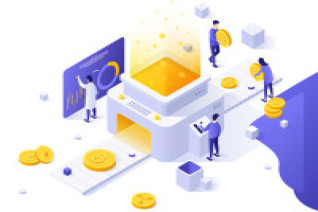Beyond Crypto: 7 Block Chain
Though often associated with cryptocurrencies, blockchain technology offers broader applications. Its secure, transparent, and decentralized nature enables transformative solutions in finance, supply chain management, voting systems, healthcare, and more. In finance, it streamlines transactions, reducing reliance on intermediaries. In supply chains, it enhances transparency and authenticity. Additionally, blockchain secures patient data in healthcare and facilitates the creation of decentralized applications and smart contracts, transforming business operations and legal agreements. This technology’s versatility is reshaping industries, illustrating its potential beyond digital currencies. Here are seven real-world applications of blockchain technology:
1. Identity Verification: Revolutionizing Digital Identity Management
Blockchain-based identity solutions provide individuals with secure control over their digital identities. Unlike traditional systems susceptible to breaches and identity theft, blockchain’s immutable ledger securely stores identity information, accessible only by authorized parties. This technology offers a reliable means of verifying identities, mitigating risks associated with data breaches and unauthorized access. By leveraging blockchain, individuals gain greater confidence in managing and protecting their digital identities, fostering a safer and more secure online environment.
Key Benefits
- Enhanced Security: Blockchain’s decentralized nature reduces the risk of identity theft and fraud.
- User Control: Individuals have full control over their personal information and can grant or revoke access as needed.
- Streamlined Processes: Verifying identities becomes quicker and more efficient, benefiting services like banking, travel, and e-commerce.
Blockchain identity verification is paving the way for more secure and user-friendly digital interactions.
2. Supply Chain Management: Ensuring Transparency and Traceability
Blockchain technology facilitates transparent and secure tracking of goods throughout the supply chain, from production to delivery. By leveraging blockchain, businesses can verify the authenticity and journey of products, reducing counterfeiting and enhancing traceability. Additionally, blockchain enables ethical sourcing by providing visibility into the origins of materials and ingredients used in manufacturing processes. This transparency not only instills trust among consumers but also helps businesses uphold ethical standards and comply with regulations. Ultimately, blockchain’s capability to track goods ensures integrity and reliability in the supply chain ecosystem.
Key Benefits
- Improved Traceability: Every transaction in the supply chain is recorded on the blockchain, providing a clear audit trail.
- Reduced Fraud: Immutable records make it difficult to manipulate information, reducing the risk of counterfeiting.
- Ethical Sourcing: Consumers and businesses can verify the origin of products, ensuring they meet ethical and sustainability standards.
Blockchain is transforming supply chain management by making it more transparent, efficient, and trustworthy.
3. Healthcare Data Management: Secure and Interoperable Health Records
Blockchain technology securely stores and manages patient health records, promoting interoperability among healthcare providers. By utilizing blockchain, patient data integrity is maintained, and privacy is enhanced. This approach mitigates concerns related to data breaches and unauthorized access, ensuring that sensitive health information remains protected and accessible only to authorized individuals. Furthermore, blockchain’s decentralized nature fosters trust among healthcare stakeholders, enabling seamless data exchange while safeguarding patient confidentiality. Overall, blockchain holds immense promise in revolutionizing healthcare data management, offering a secure and efficient solution for maintaining and sharing patient health records.
Key Benefits
- Data Integrity: Blockchain’s immutability ensures that health records are tamper-proof and accurate.
- Enhanced Privacy: Patients can control who has access to their medical data, improving confidentiality.
- Interoperability: Blockchain enables seamless sharing of health information across different healthcare systems, improving patient care.
Blockchain in healthcare data management is enhancing the security and efficiency of medical records management.
4. Cross-Border Payments: Faster and Cheaper International Transactions
Blockchain transforms cross-border payments, making them faster, more cost-effective, and transparent by bypassing intermediaries. Traditional international transfers are often slow and expensive due to numerous middlemen and currency conversions. With blockchain’s decentralized network, transactions happen directly between parties, reducing processing times and eliminating hefty intermediary fees. Moreover, blockchain’s transparency allows participants to monitor payment progress in real time, fostering trust and accountability. Overall, blockchain revolutionizes the global payment landscape, offering an efficient and economical solution for international transfers while ensuring transparency and reliability.
Key Benefits
- Reduced Fees: By removing intermediaries, blockchain significantly lowers transaction costs.
- Real-Time Settlement: Transactions are processed in real time, reducing delays.
- Transparency: Blockchain provides a transparent and traceable transaction history, enhancing trust and accountability.
Blockchain is revolutionizing cross-border payments, making them more efficient and cost-effective.
5. Carbon Emissions Tracking: Promoting Sustainability and Accountability
Blockchain’s transparent ledger enables seamless tracking of carbon emissions in intricate supply chains, ensuring accuracy and authenticity from production to distribution. This transparency supports carbon offsetting by providing evidence of emissions reduction efforts. Additionally, blockchain facilitates secure emissions trading, enabling companies to buy and sell carbon credits confidently. Reliable emissions data aids sustainability reporting, allowing organizations to showcase their environmental commitments. Overall, blockchain fosters accountability and sustainability across industries by empowering stakeholders to make informed decisions and verify environmental efforts effectively.
Key Benefits
- Transparency: Blockchain provides a clear and immutable record of carbon emissions, enhancing accountability.
- Verification: Businesses can verify and track their carbon footprint accurately, supporting sustainability efforts.
- Emissions Trading: Blockchain facilitates the creation and trading of carbon credits, promoting environmental responsibility.
Blockchain in carbon emissions tracking is driving sustainability and helping businesses meet their environmental goals.
6. Decentralized Finance (DeFi): Democratizing Financial Services
DeFi platforms, leveraging blockchain technology, revolutionize financial services by facilitating activities like lending, borrowing, and trading without traditional intermediaries. This decentralization democratizes access to financial services, transcending geographical and socioeconomic barriers, thus promoting greater financial inclusion. Additionally, removing intermediaries streamlines processes reduces costs, and enhances efficiency. Moreover, the decentralized nature of these platforms fosters innovation, as developers can create and deploy new financial products and services more rapidly and with fewer barriers. Overall, blockchain-powered DeFi platforms represent a paradigm shift in the financial landscape, offering a more inclusive, accessible, and innovative approach to financial services.
Key Benefits
- Accessibility: DeFi platforms are open to anyone with an internet connection, promoting financial inclusion.
- Lower Costs: By removing intermediaries, DeFi reduces the cost of financial transactions.
- Innovation: DeFi fosters financial innovation, offering new products and services that traditional finance cannot match.
DeFi is transforming the financial industry by making financial services more inclusive and innovative.
7. Intellectual Property Protection: Safeguarding Digital Content
Blockchain acts as an unchangeable ledger, recording and time-stamping digital assets such as patents, copyrights, and trademarks. This empowers creators to establish ownership, protect their intellectual property rights, and enforce licensing agreements with certainty. By offering undeniable evidence of creation and ownership, blockchain enhances trust and transparency in managing intellectual property. Additionally, its transparency and accessibility allow rights holders to verify the legitimacy of their assets easily, reducing the risk of infringement. Overall, blockchain transforms the landscape of intellectual property management, providing a secure and efficient solution in the digital era.
Key Benefits
- Proof of Ownership: Blockchain’s timestamping provides irrefutable proof of ownership for digital content.
- Rights Protection: Creators can protect their intellectual property rights more effectively, reducing infringement.
- Licensing and Royalties: Smart contracts on the blockchain can automate licensing agreements and royalty payments, ensuring fair compensation for creators.
Blockchain is enhancing intellectual property protection by providing a secure and transparent way to manage digital rights.
In conclusion, blockchain technology is revolutionizing various sectors beyond cryptocurrency. From identity verification and supply chain management to healthcare data management and cross-border payments, blockchain is improving efficiency across segments. Its applications in carbon emissions tracking, decentralized finance, and intellectual property protection further demonstrate its transformative potential. As blockchain continues to evolve, its impact on these and other areas will likely expand, fostering a more secure, transparent, and efficient digital world.



